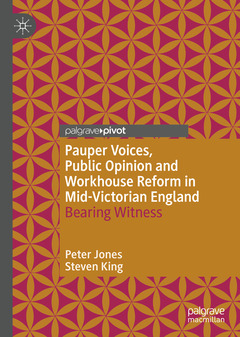Description
Pauper Voices, Public Opinion and Workhouse Reform in Mid-Victorian England, 1st ed. 2020
Bearing Witness
Authors: Jones Peter, King Steven
Language: English
Approximative price 58.01 €
In Print (Delivery period: 15 days).
Add to cart136 p. · 14.8x21 cm · Hardback
Description
/li>Contents
/li>Biography
/li>Comment
/li>
Fills a considerable gap in our understanding of contemporary attitudes towards institutional welfare
Explores the possibility that a concerted ‘movement’ existed that sought to place pressure on those with responsibility for workhouse administration
Identifies a workhouse reform ‘movement’ beyond the obvious candidates of the Workhouse Visiting Society and the voices of popular critics such as Charles Dickens and Florence Nightingale
These books may interest you

Oral History, Health and Welfare 53.83 €



